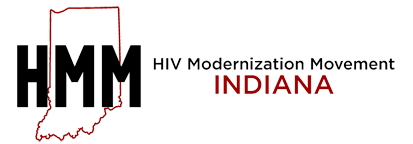Get Help
For people living with HIV, a contentious relationship, a personal misunderstanding or even a minor infraction of the law can lead to a long jail sentence and public disclosure of your HIV status. HIV-specific criminal charges have been filed in the U.S. more than 1,500 times. In Indiana, charges are filed about once a month for HIV-related offenses. You can also find help if your charged under any of Indiana’s HIV criminal laws.
- Click here for a video course on our HIV Disclosure Law in Indiana and how to protect yourself.
- Click here to learn about all of Indiana’s HIV criminal laws.
Guidance for People Living with HIV Who Are Threatened with, or Are Facing, Criminal Prosecution for HIV Nondisclosure or Exposure.
What You Need to Know
It is awkward, but having proof that you shared your status to sex or needle-sharing partners can help protect you from prosecution (but it is no guarantee). Possible strategies include:
- Talk about your status in front of your partner and a third party you trust who could testify that you disclosed
- Use your cell phone to record talking about your HIV status with your partner
- Have your partner sign a disclosure acknowledgement form prior to any sexual or needle-sharing activity (see sample)
- Save email, text exchanges, voicemail recordings, social media and dating app profiles or other evidence that you shared your HIV status including the date messages were sent (If arrested, your computer may be seized; save copies in a safe separate location)
- Take your partner with you to your doctor or caseworker and ask them to note your partner’s knowledge of your HIV status in your file
- Send yourself an email or keep a diary noting occasions when you discussed your HIV status with your partner
- Make note of physical evidence of your HIV status, like medications in clear sight, doctor visit reminders, printed HIV-related brochures or magazines, etc., that others have seen.
If you have been accused or charged with non-disclosure:
- DO NOT talk to police or investigators without a lawyer present, unless to give identification
- DO NOT acknowledge your HIV status to law enforcement officers without a lawyer present (no matter how well-known your HIV+ status might be)
- DO NOT provide blood, saliva or give permission for any medical tests.
- DO NOT sign any documents without a lawyer present.
- DO NOT contact the person who is or may be pressing charges against you.
- DO PROTECT yourself from further criminal charges by not resisting arrest.
Tell them you want a lawyer and will not answer questions until you have one.
They may try to convince you things “will be easier” if you cooperate; this is rarely true. Providing information before you have the help of a lawyer is NEVER to your advantage, even if you know you did nothing wrong.
Some people get convicted because they cooperated before they had a lawyer. Be polite, but absolutely do not talk, acknowledge, provide information or sign anything until you have a lawyer.
You have and should exercise your right to remain silent until you have a lawyer. If you cannot afford one, the state must provide one for you. Finding a lawyer knowledgeable about HIV and criminal law can be difficult.
Contact your local public defender’s office, HIV legal clinic or HIV service provider or reach out to the following agencies for a referral or other resources:
- Center for HIV Law & Policy www.hivlawandpolicy.org
- Sero Project: seroproject.com or email them at info@seroproject.com, please include your phone number.
- ACLU of Indiana Get Help: www.aclu-in.org
- Lambda Legal Defense Help Desk: lambdalegal.org Lambda’s website has “helpline” numbers for different parts of the country.
- HIV Modernization Movement – Indiana: While we are not lawyers, you can email us at info@HIVModernizationMovement.org, please include your phone number and we may be able to help connect you.
HIV Criminal Legal Resources
- A Legal Toolkit: Resources for Attorneys Handling HIV-Related Prosecutions, Center for HIV Law and Policy
- Routes, Risks, and Realities of Infectious Disease Transmission: Information & Resources for Prosecutors & Law Enforcement Professionals, Center for HIV Law and Policy et al.
- Spit Does Not Transmit: A Fact Sheet for Law Enforcement Personnel, The Center for HIV Law and Policy et al.
- Guidance for People Living with HIV Who Are At Risk of, or Are Facing, Criminal Prosecution for HIV Nondisclosure or Exposure, Center for HIV Law and Policy
Civil & Discrimination Legal Resources
- Indiana Legal Services, Ryan White Legal Project (RWLP) – www.indianalegalservices.org/ RWLP assists low-income individuals who are enrolled in Ryan White Part B services with a variety of civil legal issues faced by PLWHA. Work with your HIV care coordinator or non-medical case manager to make a referral to RWLP. Click for client brochure. or Click for provider brochure.
- Indiana Civil Rights Commission (ICRC) – www.in.gov/icrc/ (Employment and Housing Discrimination)
- Equal Employment Opportunity Commission (EEOC) – www.eeoc.gov (Employment discrimination)
- Lambda Legal Defense Help Desk: lambdalegal.org Lambda’s website has “helpline” numbers for different parts of the country
- Department of Housing and Urban Development (HUD) Fair Housing and Equa l Opportunity (FHEO) – www.hud.gov (Housing Discrimination)
Why ADA Title II fits HIV criminal law: People living with HIV are protected under the ADA; criminal laws that impose harsher penalties solely because of HIV status can be unlawful disability discrimination by a state/local government (as in Indiana). Click the links below to learn more.
- The Power of the ADA to Challenge HIV Criminal Laws (Advocacy explainer) How to structure ADA-based challenges to HIV criminal statutes.
- Webinar: The Americans with Disabilities Act: Old and New Tricks to Combat Discrimination against PLHIV — explains how to apply the ADA to challenge HIV Criminal Statutes.
- Collection of Resources on the Issue
